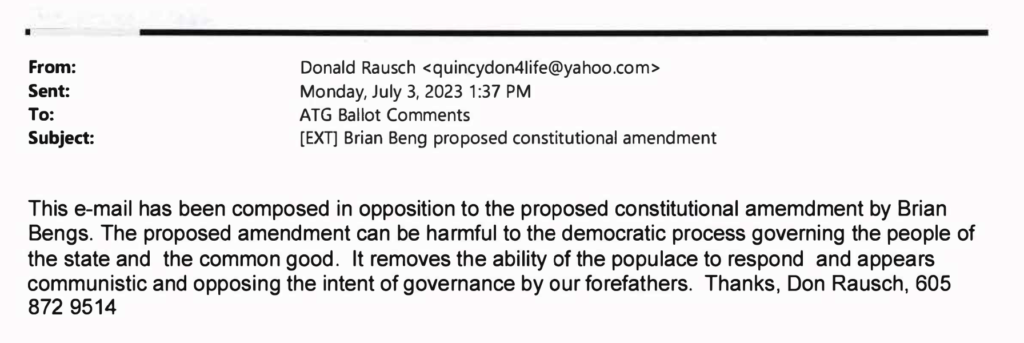Last week Attorney General Marty Jackley issued his draft ballot explanation for Aberdeen Democrat Brian Bengs’s proposed initiated amendment to prohibit Legislative repeal and amendment of voter-approved ballot measures for seven years. The Attorney General’s proposed title and explanation seem clear, unproblematic, and redundant:
Title: An Amendment to the South Dakota Constitution Prohibiting the Legislature from Amending or Repealing Ballot Measures for Seven Years.
Explanation: Laws are enacted in South Dakota by the Legislature or through ballot measures approved by the voters of the State. Currently, once a ballot measure becomes law, the Legislature can amend or repeal the law.
Under this proposal, any ballot measure approved by the voters may not be amended or repealed by the Legislature for seven years from the date the measure is enacted [Attorney General Marty Jackley, draft statement, filed with Secretary of State 2023.06.28].
SDCL 12-13-25.1 allows the Attorney General up to 200 words in his explanation; Jackley figures he needs only 64 to objectively, clearly, and simply summarize Bengs’s initiated amendment. And even those 64 words only restate what Article 3 Section 1 of the South Dakota Constitution says about who gets to make laws and the one sentence Bengs would add thereto:
A measure approved by the electors may not be repealed or amended by the Legislature for seven years from the enacted date of the measure [Brian Bengs, proposed revised amendment, 2023.05.04].
No suggestion that this restriction of Legislative power may be challenged on Constitutional grounds, no warning that courts may have to clarify it, no reminder that the Legislature can’t alter amendments, no delving into definitions or fiscal impacts, all of which Jackley has done to sandbag currently circulating initiatives—here, Jackley offers only the barest facts about the amendment Bengs would bring via petition to the 2024 ballot.
We have a couple more days (through Saturday, I think) to comment on Jackley’s draft before he produces a final version. As usual, the one comment submitted so far does not respond to the Attorney General’s title and explanation and instead incorrectly opines on the initiative itself:

Perhaps every time the Attorney General invites public comment on a draft title and explanation of a ballot measure, he needs to issue an explanation of the law providing for this dilatory and thus far mostly useless public comment period. 2021 Senate Bill 123, embedded as of November 1, 2021, in the second and third paragraphs of SDCL 12-13-25.1, calls for the Attorney General to post his draft statement, the title and explanation of an initiative, for comment, review all comments submitted, and revise his statement in response to the comments as necessary. The statute does not invite comment on the initiative itself. The statute does not empower the Attorney General to revise, reject, or endorse the initiative itself. The statute does not remove the requirement that the Attorney General’s statement be objective.
Don Rausch’s deeming of the Bengs amendment as anti-democratic and communistic is thus, while vague and amusingly illogical, absolutely irrelevant to the objectivity, clarity, and concision of the Attorney General’s draft explanation. We’ll see if anyone else can provide relevant comment to guide the Attorney General in the next couple days, but I suggest that no comment is needed on this draft explanation, which is about as objective, clear, and simple as an A.G.’s explanation can be.
Thanks Corey.
The majority of the South Dakota electorate is too ignorant to comment on proposed legislation, including proposed ballot measures. They need sinclair broadcasting and faux entertainment to tell them what to think. Donald got their messages.
The AG earned their “C” on this explanation. Let the voters decide if they’ve had enough of the legislature taking away their laws, rights, and tax cuts.
“Appears communistic”?
What is that even supposed to mean?
It took the AG nearly 2 months to come up with a three sentence comment on a one sentence amendment. Thus, it was delayed as long as possible to impede the ability to start collecting signatures too early in the summer.
Indeed—60 days to simply rephrase the amendment text is purely dilatory.
Fortunately for Bengs and other practitioners of direct democracy, we’ve added six months to the circulation period. If Bengs gets his petitions ready this week, ha can collect signatures for 10 whole months instead of the four months he’d have had left in the previous few election cycles.